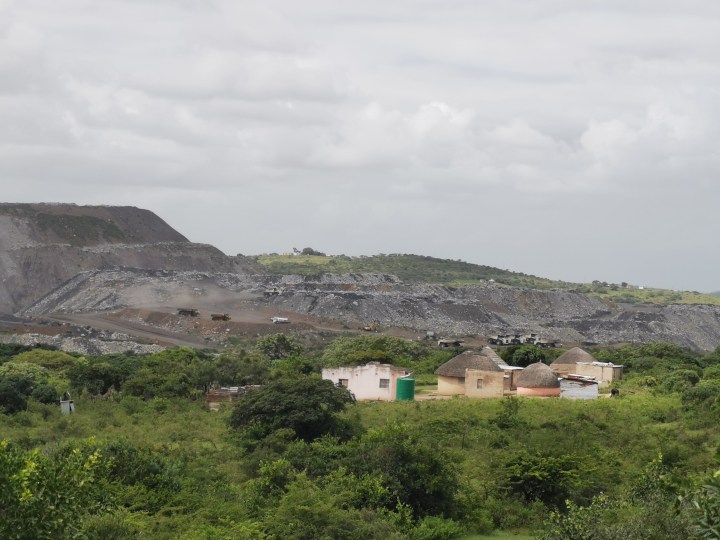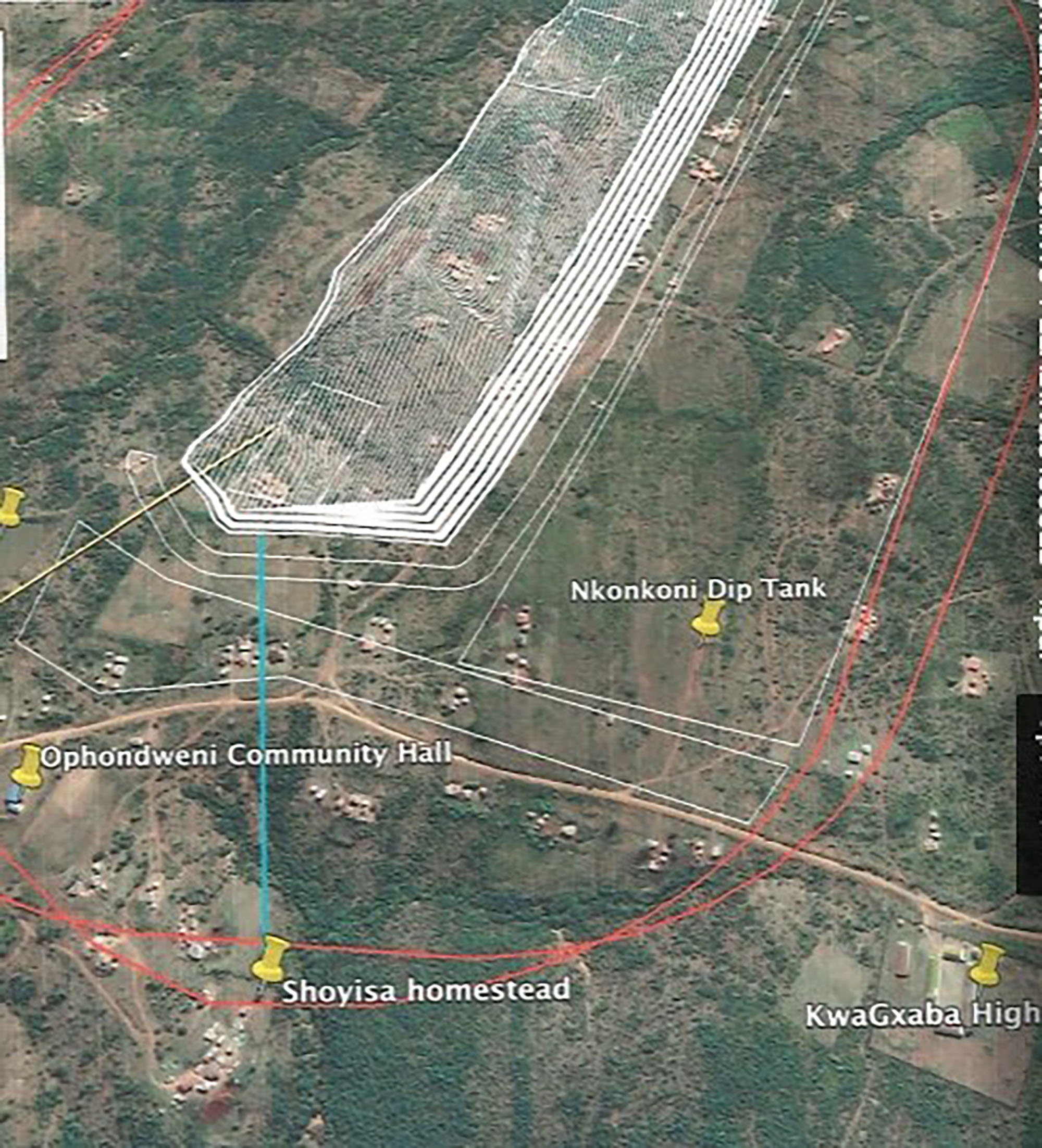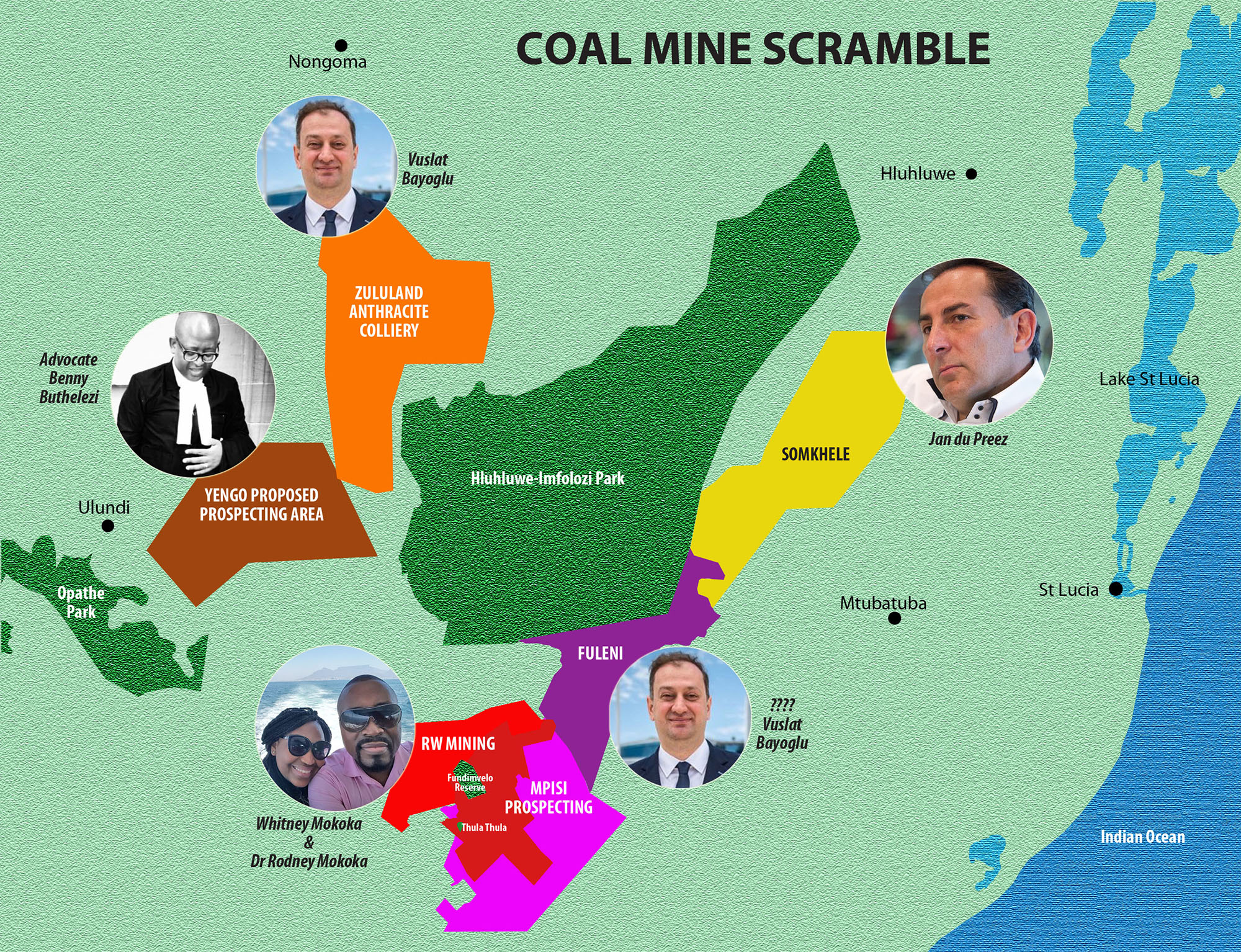COAL VS COMMUNITIES
KZN rural residents beg high court to save their homes and livelihoods and rein in rampant Tendele coal mining

‘Tendele acts as if it can do anything it wants in our community … It is as if our lives do not matter. We are merely dots on a map to be told, and not asked.’ — Israel Nkosi, resident of the Emalahleni area in rural KwaZulu-Natal.
Rural communities have sought protection from the high court after discovering that hundreds of people will have to abandon their homesteads soon – or be forced to live adjacent to the clouds of coal dust, coal trucks, noise and other daily disruption from two more mining pits in northern KwaZulu-Natal.
The exact number of people facing relocation remains unclear, though residents estimate in a court affidavit that more than 120 families are at risk (with some homesteads housing as many as 30 people).
An urgent interdict application has been scheduled for April 4 in the Pietermaritzburg High Court after members of the Mfolozi Community Environmental Justice Organisation (Mcejo) discovered that Tendele Mining (Pty) Ltd planned to enter their community later this month to start relocating people, building fences and truck haulage roads and for other “mining-related activities”. Tendele is a subsidiary of the unlisted Petmin group.
The applicants – some who have expressed fears for their personal safety – claim they have not been properly consulted on the precise impacts of Tendele’s latest plans. This was despite a damning court ruling in May 2022 in which Judge Noluntu Bam castigated the mining company’s “offensive” and unlawful behaviour. Judge Bam went as far as likening Tendele to “an unbridled horse that showed little or no regard for the law”.
Ten months after she ordered Tendele to comply with legal requirements to consult affected residents; to remedy its environmental impact assessment (EIA) process, and also obtain residents’ consent to relocate their homes in terms of the law, the case is back in the court arena.
In sworn affidavits that form part of the latest court papers, local residents allege that several people in the area still live in fear of being murdered or having their homes burnt down if they dare to speak out or resist being moved to make way for Tendele’s extended coal mining plans.

Dots on a map – The Shoyisa homestead (bottom left) is less than 550m from the proposed Ophondweni mine pit. (Picture: Supplied))
Gunned down by assassins
In his affidavit, Emalahleni resident Israel Nkosi recalled the execution-style murder of his friend Fikile Ntshangase, who was gunned down by assassins in October 2020 because of her anti-mining activism in the area.
“Mam’ Fikile’s murder was a terrible blow to me, and to the community. She was a leading Mcejo member and very vocal against Tendele mine expanding its operations into our area. Her murder was directly as a result of her activism.
“Tendele’s attitude and the attitude towards us is one of complete disrespect and lack of compassion. We are simply in the way of its profit-making and must be dispensed with as quickly as possible, without consideration of our lives or international best practice,” Nkosi says in his court affidavit.
“It is as if our lives do not matter – we are merely dots on a map to be told, and not asked. Our lives do matter and we know our rights.
He goes on to describe a number of more recent meetings convened by local traditional council officials, some of which were poorly attended as some residents feared to attend such meetings.
“At the meeting at Ophondweni on 22 October 2022 it was reported that the traditional leadership opened the meeting with a threatening remark that translates as: ‘If anyone speaks against the mine, his eyes will turn to blood’.
“I note that I heard a threat was made against the families who have not signed the relocation agreement in Ophondweni; they would be killed in their houses.”
He further claims in the court papers: “We do not trust the traditional council, as the Indunas are paid a monthly stipend by Tendele and act for Tendele. They do not have the community’s best interests at heart. This has been communicated to Tendele many times through our attorneys, without any change in Tendele’s approach.”
Tendele’s attorneys (Malan Scholes Inc) have indicated that they will oppose the application, but have also provided a written undertaking to Mcejo’s legal representative (Kirsten Youens of All Rise Attorneys) that Tendele will hold off from any relocation and mining-related activities until 4 April, when the interdict application is heard.
Tendele is only scheduled to file responding papers later this week (17 March), but Our Burning Planet contacted Petmin chief executive Jan du Preez and senior Tendele senior manager of corporate social investment Nathi Kunene to request comment on the latest court allegations.
Du Preez did not respond, but Kunene said: “We can confirm that we have received the affidavit, and we are in the process to prepare our replying affidavit and at this point have no further comments.”
The company has previously argued that thousands of jobs in the coal and metals sector nationwide are at risk if Tendele is refused permission to extend mine operations.
Local resident Petros Shoyisa
Back in the mine-affected area, local resident Petros Shoyisa says his attorney discovered that his homestead is located just 550m from Tendele’s proposed Ophondweni coal mining pit.
Shoyisa said in his affidavit that he started building a homestead in 1983. It now had 10 houses, a rondavel and three livestock kraals.
“I own more than 100 head of cattle, about 40 goats and about 20 sheep … They drink water from the Ophondweni community dam, which will be fenced in by the mine.”
______________________________
Visit Daily Maverick’s home page for more news, analysis and investigations
______________________________
The community would also lose access to large areas of communal grazing land, and his livestock would become vulnerable to being run over by coal trucks – traffic volume estimates are for one coal truck to travel every 43 seconds between Tendel’s coal wash plant and the new mining pits.
“I live here with my wife, three children, my two brothers and their wives and their 12 children. There are five grandchildren living with me too. My two deceased brothers’ children live with us. There are seven of them. This means there are 33 people living in my homestead.”
Several children in the area would no longer be able to walk to school when access roads are fenced off, and would battle to concentrate at school because of the noise of coal trucks and dynamite blasting.
Several residents depend on water standpipes or the rainwater collected from their rooftops into JoJo tanks. He feared that mining could affect the future of standpipes, while clouds of coal dust from mining and coal trucks would settle on rooftops and pollute rainwater harvests.
Soyisa said he was shocked to receive a letter from Tendele on 14 February, and had not been invited to any meetings to discuss the full impact of the mining company’s activities.
Local farmer MJ Mkhwanazi
Resident MJ Mkhwanazi, who was born in the area in 1960, said he currently has 10ha of cropland, although water supply is unpredictable. Nevertheless, he harvested 1,280kg of beans last year (worth R38,400) and along with maize, he planted around 15,000 cabbages that normally sold for R10 each.
“I am not farming to simply eat and feed my family. I am a businessman, and I believe that the land can feed the nation. I make a lot of money harvesting my land. Everyone should do the same, and then they wouldn’t complain about not having money.
“If the mine comes to Ophondweni, I know that my harvest will die from dust and lack of water. One of my large fields is very close to the haul road, and I have seen what the road to the Somkhele coal mine looks like – everything is covered in coal dust. The trucks also cause dust.”
Mkhwanazi said a local induna had assured residents that they would be paid compensation if they agreed to move, and that people would also get jobs at the mine.
“I am not happy about the situation at all. This mine is going to affect me and my land very badly. If the mine is here, I won’t be able to plant anything because it will be too polluted … Some people don’t realise that if the mine comes here, life will never be the same again.
“(Some people) say they are hungry, and I say it is easy to come out of that if you plant your land. But if you sell your land, you will have nothing.”
Sikumbhuzo Buthelezi says his homestead has seven houses and 7ha of crop fields.
“Unbelievably, no one has ever come to my house, called me, arranged a meeting with me or made any effort to contact me about the fact that I live within 500m of the mine pit, and need to be relocated.”
He was also shocked to hear about the letters sent to local residents advising that Tendele planned to start mining soon.
“Why were our attorneys not told about this? Why is Tendele sending letters to people saying that they are going to fence land and move people? They are clearly trying to force us to move.”

The location of existing or planned coal mining ventures near Richards Bay. The Tendele mining area is in yellow, marked ‘Somkhele’. (Graphic: Sheena Carnie)
Emalahleni resident Donald Zitha
Emalahleni resident Donald Zitha said he refused an offer of R200,000 to relocate his homestead, but his wife allegedly signed an agreement in his absence, and without his consent.
“There have been so many problems with intimidation around me. My neighbours’ houses were burnt down. There were times when people would shoot guns at night near my home. For more than a month, I slept in the bush every night in fear for my life,” he stated.
In his affidavit, Israel Nkosi suggests that existing problems of access to grazing land and crop fields in the area will be exacerbated if 120 homesteads at Ophondweni, Emalahleni and Mahujini are relocated.
“Most of us live sustainably on our land and many of us have been able to thrive and provide well for our families through farming. To the Zulu people, land is everything. Without our land, we are nothing.
“Unfortunately for us, there is coal in the ground on which we live, and so our way of life and our livelihoods are threatened.
Mining company’s action plan
Nkosi argues that the mining company was acting “as if it can do anything it wants in our community”.
“It is as if our lives do not matter – we are merely dots on a map to be told, and not asked. Our lives do matter and we know our rights. We are entitled to meaningful opportunities to participate in decisions that affect us.
“I know what it is like to be in close proximity to a mine when they blast the ground apart. The sound is terrifying, but what is even more scary is the impact of the air vibrations on a person’s lungs and the shaking of the ground.
“It feels as though you have fallen hard on the ground, and winded yourself. Windows rattle and crack. I am an adult man, and I find it scary. I do not want to imagine what the poor primary school and creche children will feel like when they are so close to this occurring. They should not have to suffer through this at all.”
However, he suggests that if Tendele is granted permission to start clearing roads, build fences and other preparatory work in preparation for mining, then “the horse will have bolted, with no means to put it back into its stable”.
He further complains that Tendele’s apparent rush to start mining can only be seen as a flagrant disregard of the law and the rights of those who are “currently living peacefully and happily on the land it wishes to invade”. DM/OBP




















 Become an Insider
Become an Insider
South Africa is a country where unfortunately there is no respect whatsoever for the people and their livelihood; and not for the laws either.
Where is the DMRE in all this? Seems to MIA.
Where are the ANC in protecting these people? Nowhere to be seen as there is nothing for them to steal!
Another example of profit taking precedence over people – destroying their livelihoods. Why would a farming community want to work at a coal mine and be deprived of their traditional way of life? We see this happening across Africa where communities who have lived off the land for centuries are viewed as standing in the way of progress, as if continuing their simple way of life in tune with nature is something to be despised.
Terrifying. Land cursed with coal deposits attracts an especially rapacious kind of predator, who destroys not only the value of the land, but the communities dependent on it, and the DMRE can’t issue these jackals with the mining rights fast enough.